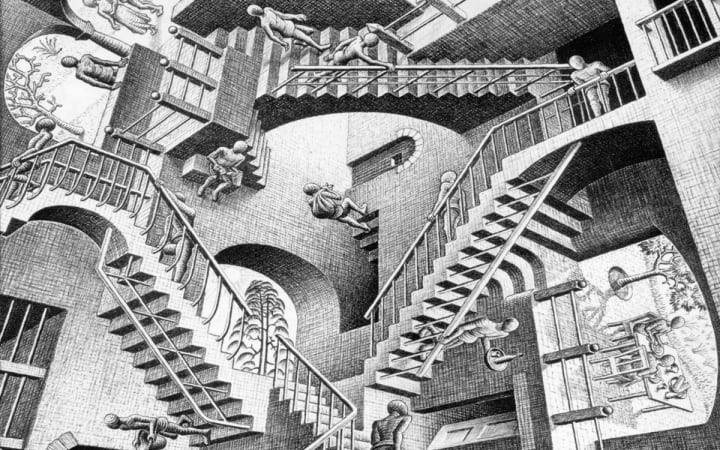The Tao of Guitar
How to write songs without thinking

This is where you need the Tao. What the heck is a Tao you may ask? Well, here is what Lao Tzu had to say about it:
The Tao is like a bellows It is empty yet infinitely capable The more you use it, the more it produces The more you talk of it the less you understand.
Trying to understand the essence of Tao is like trying to grab a slippery worm: the more you try to grasp it the more it wriggles away. You might say Tao is the complete and utter intuitive understanding of something without resorting to words or thoughts to express it. This is tough for our Western minds because we are analytical reasoning types born of the Greek tradition of critical thinking. The Western mind is an absolute fragmentalist. Our language is an expression of our philosophy and science: composed of 26 little letters which form prefixes and suffixes that make words and sentences. It’s linear, it’s logical; it’s possible to find a word with exactly the right meaning.
The Chinese language however is holistic, symbolic and idea-based.
The essence of Tao is dark and mysterious, having, itself, no image or form. Yet through its non-being, are found image and form. The essence of Tao is deep and unfathomable, yet it may be known by not trying to know.
To me, the essence of the Tao is most easily found in nature. Once, when I was traveling through a really remote area of Northern BC, I stopped by a lake to camp out for the night. The lake was still, there was a thin mist rising off the water and it was completely quiet (not to mention a little spooky).
While I sat there gazing at the water mesmerized by the whole scene, a loon cried out on the far side of the lake. Most Canadians know exactly what that sounds like. I have to say the shivers ran up and down my spine and the hair on my neck stood on end. I felt like the loon on the lake was talking to me. (You might be thinking I’m the loon at this point!) How can I explain what happened? The answer is I can’t. The Tao is that moment, that feeling, that intangible knowing and not knowing. It is grasping the ungraspable.
The Red Wheelbarrow
so much depends upon
a red wheel barrow
glazed with rain water
beside the white chickens.
~William Carlos Williams
This to me is one of the most extraordinary poems ever written. If you just read it with it your brain, you might think it empty or plain...you won’t get it. Maybe you can’t get it. It’s not a joke or a riddle or a trick. It’s the Tao. I can try to help you: Why does so much depend upon a red wheel barrow glazed with rain water beside the white chickens? Concentrate on the image without thinking about it. The essence of Tao is knowing what the poem means without being able to say what it means. Is the answer to the question, nothing, or maybe everything?? The more you analyze the poem, the less you understand it.
The beauty of Lao Tzu was that he claimed he was a complete simpleton who didn’t know anything. He went through life nursing at the breast of the universe, a perpetual child open to all. And in that, he gained wisdom. Now, how does this all relate to She loves me, yeah, yeah, yeah?
The essence of music is the nonverbal communication of an idea or emotion. Music is sign language for the deaf at heart. We’re all deaf, dumb and blind when it comes to issues of the heart, love, life, meaning and the underlying themes of life. We take the bus, go to work and eat our lunch. But there is a silent soundtrack to everyone’s life continually playing. Just like there is a multi-act play with scenes and dialogue and characters in the very fabric of life. Musicians and artists in general are gifted at portraying that underlying thing that is happening to all of us: to be truly touched by a song or work of art is to understand the Tao.
The Tao, or the Taoist ideal in art, is the suggestion or allusion to something, either an idea or emotion. Music is the art of the unstated, the unspoken, the language without words that anyone can understand as long as he or she has an ear to hear. Music has the power to bring together different cultures, races, sexes or religions. It is the great artistic unifier. Music has often been called the language of love. Though it could also be called the language of brotherhood: the great embracer of all peoples.
To continue, the real power of music, and specifically a song, is in the understatement, the unsaid, the suggestion of an idea rather than the explanation. When everything is completely laid out and you have expressed yourself thoroughly, there is no room for interpretation and the listener becomes bored. It is the mystery of the song that is intriguing. It allows the listener to find himself in the words and music, and to relate to it on a personal level. It becomes his song.
Here is a great example from Robert Frost’s famous poem:
The woods are lovely, dark and deep And I have promises to keep And miles to go before I sleep And miles to go before I sleep
This is so simple yet somehow so profound, and yet Frost hasn’t even really said anything. He makes a picture in our mind that touches something in us. I instinctively know what he is saying but if I try to convey it, I loose it. This is pure Tao.
Taoism in art is intent on understanding the underlying theme, the inner life as opposed to the outer material world. It is the attempt to make visible the invisible, to express the spiritual life.

East meets West
An experiment was done with two groups of people: one group of Asians and another group of North Americans. The scientists showed each group a large aquarium of fish and then asked them to describe what they saw. Without exception, all the Asians described the background of the fish tank. They talked about the plants and the rocks on the bottom of the aquarium.
The Westerners, also without exception, described the fish. The Asians reasoned that the fish were only temporary residents of the aquarium while the background would always be there. The Westerners conversely reasoned that the fish were the ones doing something and the background was irrelevant because it was inactive, inert.
This way of looking at life spills over into Asian views of art. Westerners generally portray a landscape with the intent of showing every detail, conveying a photographer’s sensibility of composition. An Asian artist tries to convey the inner meaning, he tries to reveal the spiritual side of life. The detail is unimportant.
I think this has to do with the western obsession with science and all things material. Science is the study of the outer world, whereas religion or spirituality is the study of the inner world. The materialist would say there is no inner world: if we look inside ourselves all we see are organs, cells, molecules and atoms; life is the interchange of energy/matter and that’s all there is.
The spiritual person knows that the real world is the inner world. The artist, by virtue of his or her own creative nature looks at life with the eye of a painter: the artist is an observer of life; the way people relate to one another; and the underlying structure or laws that govern life.
Paradox
A paradox is a 3-dimensional puzzle that cannot be solved. An example of a paradox in literature is in Animal Farm by George Orwell:
All animals are equal, but some are more equal than others.
This is a conflicting statement but Orwell is pointing out the hypocrisy of government and society that views some people as better or more deserving than others.
A paradox in art can be shown by M.C. Escher who makes stairs that go up and down at the same time. What!? you say. He paints staircases that appear to go either up or down depending on how you look at the painting. It’s actually an optical illusion.

In poetry or songwriting, a paradox is when you say something with multiple meanings. You paint a picture with words which when examined can’t really be seen completely or understood totally.
Example: (because I know you’re dying to see one.)
Plenty of room at the Hotel California You can check in anytime you want But you can never leave
Okay, so what’s he talking about? What hotel? What does he mean you can’t leave? Don’t forget about Lao Tzu. Ancient Chinese philosopher says: The more you look, the less you understand. (I can see him smiling benevolently now.)
***
If you enjoyed this story you can find more of my writing here and here
About the Creator
Richard Revelstoke
Author, musician, activist. Played in rock bands now into jazz. Lives in Vancouver, Canada working on third novel. www.richardrevelstoke.com






Comments
There are no comments for this story
Be the first to respond and start the conversation.